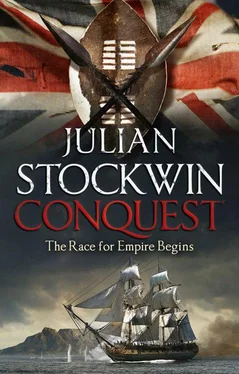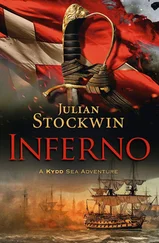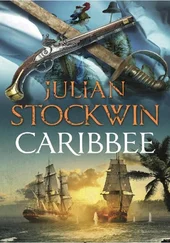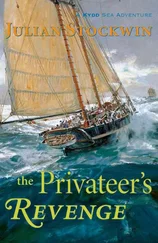Julian Stockwin - Conquest
Здесь есть возможность читать онлайн «Julian Stockwin - Conquest» весь текст электронной книги совершенно бесплатно (целиком полную версию без сокращений). В некоторых случаях можно слушать аудио, скачать через торрент в формате fb2 и присутствует краткое содержание. Жанр: Старинная литература, на английском языке. Описание произведения, (предисловие) а так же отзывы посетителей доступны на портале библиотеки ЛибКат.
- Название:Conquest
- Автор:
- Жанр:
- Год:неизвестен
- ISBN:нет данных
- Рейтинг книги:5 / 5. Голосов: 1
-
Избранное:Добавить в избранное
- Отзывы:
-
Ваша оценка:
- 100
- 1
- 2
- 3
- 4
- 5
Conquest: краткое содержание, описание и аннотация
Предлагаем к чтению аннотацию, описание, краткое содержание или предисловие (зависит от того, что написал сам автор книги «Conquest»). Если вы не нашли необходимую информацию о книге — напишите в комментариях, мы постараемся отыскать её.
Conquest — читать онлайн бесплатно полную книгу (весь текст) целиком
Ниже представлен текст книги, разбитый по страницам. Система сохранения места последней прочитанной страницы, позволяет с удобством читать онлайн бесплатно книгу «Conquest», без необходимости каждый раз заново искать на чём Вы остановились. Поставьте закладку, и сможете в любой момент перейти на страницу, на которой закончили чтение.
Интервал:
Закладка:
In an hour or so the rain had diminished and the frenzied battering lessened to a steady hard driving from the east. There was no navigating in this but there was sense in trying to reduce the awful strains aloft. Kydd raised salt-sore eyes to meet Kendall’s. ‘We’ll scud,’ he croaked, ‘reefed fore-topsail, fore-topmast staysail.’ The topsail would impel L’Aurore before the blast, lifting the bow, and the staysail would act to damp any deadly yaw.
The rain cleared and a desolate grey seascape was revealed – an empty expanse with not a sign of any of the ships that had occupied his attention. When their sails tentatively took the fearful wind, L’Aurore immediately began to roll. It was not the characterful motion they were used to, running before the wind, but a vicious, screwing heave that had each man reaching for a solid hold.
At the same time there was a near unstoppable yaw from one side to the other that left the four helmsmen struggling. ‘A cable, let out over each quarter,’ he shouted hoarsely at the boatswain, clinging to the mizzen shrouds.
Oakley nodded and, working hand to hand, made his way below. Kydd watched him go – his was a near impossible job: in the insane rolling, he had to rouse out a substantial hawser and heave it overboard to trail in their wake as a damper on the yawing.
It was finally done. The yawing eased and L’Aurore plunged on before the wind into the gathering darkness. Mercifully, with the night, the winds eased, and with little in the way of swell, the waves subsided. Only a few hours had passed, from the first appearance of the Ox-eye to its dissipation. Kendall had had it right: it was a species of local tempest that was short but shockingly intense, a product of the tropic regions.
The morning brought an innocent sky, the wind a kindly north-easter once more, the sea a picture of blue tranquillity. It was time to take stock.
Thanks to their precautions, there was no serious hurt to the frigate, and hands were set to clearing away between decks the broken articles, mess slopping about, all expected consequences of foul weather.
But where were they? They had been some hundreds of miles from the coast of Africa and south of Madagascar when the Ox-eye had hit. Then they had scudded before the wind – an easterly, so ironically they had been urged on towards their final destination, Lourenço Marques. They must now find their latitude, which would be possible with precision at noon.
The French were nowhere to be seen, but neither were the Indiamen. Who knew what had happened to them in those wild hours of the previous day? One mystery was solved later that afternoon: two ships close together were sighted ahead and away to the north. They turned out to be the Indiamen, one under tow by the other and relieved to be still afloat. The big ships’ much higher freeboard had enabled them to survive the rolling at the cost of offering a larger area for the wind to press against and they had wisely chosen to scud before it.
Their latitude placed them comfortably south of the Limpopo River further up the coast from Lourenço Marques and it was with some relief that Kydd shaped course towards it, closing with the coast. That left just one concern: where were the French?
The immediate task was to get the Indiamen to safe harbour. As the three storm-lashed ships made their way slowly south, Kydd and the master conferred.
The only chart Kendall had been able to locate was a private Dutch one of ancient provenance. It seemed to warn of a breaking bar across the entrance to the port, one Baixo Paiva Manso. Past that, it opened into a dismaying twenty-mile expanse of shoals at the estuary of the Rio Espiritu Santo. And in several places at the point where the river discharged into the sea there was the ominous-sounding zandgolven , which had been underlined by an unknown hand. It didn’t need much guessing to realise it meant sub-sea sand waves, shifting, unchartable hazards.
Without a pilot, it was going to be a difficult passage, and when they arrived off the sprawling whitish sand-hills and sliding overfalls of the river mouth, the bar was breaking and visible, but not the treacherous sand waves.
With a seaman at the fore-chains chanting the depths and another aft, they slipped past the scrubby margin of Africa in the rising heat until they were within the twin low arms of Ponta da Macenta and opposite, the Ponta dos Elefantes, the wind fair for their goal.
Lourenço Marques lay ten miles further, and Kydd had kept quiet about his fear that, if this was the only port worth the name on the coast to find safe haven, would not the French head for it as well?
It was too late now: they were within the bay and the wind that made it fair for entry would at the same time make a hasty exit impossible. They went on, the coast to starboard rising in dark-green cliffs. Here and there palm-tree clumps rose above the vegetation, and as they closed with the land, the fetid fragrance of Africa reached out to them.
Then at the sharp turn into the river there it was: a decaying fortress set about with palm trees and scrub, a scatter of humble dwellings and fishing boats. Lourenço Marques, the most southerly outpost of the ancient Portuguese Empire.
And not a Frenchman to be seen.
Chapter 8

It was a masterly stroke, Renzi conceded, and one that could never have been contemplated in any modern state. The grain shortage was the biggest single problem facing them and Baird, in a direct, soldierly manner, had found a way to solve it.
Recognising that it was a matter of survival until the ships he had sent out returned, he had set about looking for an interim local supply and reasoned that there had to be those who would hide supplies with a view to cashing in at famine rates and farmers who were withholding their grain in the hope of higher returns.
By a simple device he had trumped both. A regulation was introduced that repealed duties but specified that sales of cereal crops would henceforth be at a fixed price, which would be rigorously enforced. In fairness, the government would also be bound by this and in fact was opening its grain stores for immediate purchases.
Before long creaking lines of ox-wagons materialised as hoarded stocks were brought in and government stores swelled. The crisis had been averted.
The question of currency had not been so easy. As most English specie had been lost in the Brazilian wreck what was to be the common coinage? There had been only two options: print banknotes against the Treasury in faraway London or continue to use the current system.
Baird had chosen to avoid the risks of runaway inflation in printing their own, which left no option but to persevere with what existed. The trouble was that ships touching at the Cape for centuries had left the colony awash with the most exotic forms of coinage, each one of which had to have its English equivalent.
The official medium of exchange was the rijksdaalder or, as it was more commonly known, the rixdollar, and it was Renzi’s task to draw up a table of equivalence: the rixdollar of forty-eight stuivers against each coin of foreign origin and that against English sterling.
It was a far from trivial undertaking, for there were those who stood to make a tidy sum if the conversion was struck in their favour. It was no longer to be the sentiment of the market that decided rates, and opinions were sharply and loudly divided.
With Ryneveld’s canny assistance Renzi completed the wording of the grand proclamation. It allowed that, for the better regulation of trade and the prevention of disputes, the values of money in circulation in Cape Town should be fixed in accordance with the table shown.
Читать дальшеИнтервал:
Закладка:
Похожие книги на «Conquest»
Представляем Вашему вниманию похожие книги на «Conquest» списком для выбора. Мы отобрали схожую по названию и смыслу литературу в надежде предоставить читателям больше вариантов отыскать новые, интересные, ещё непрочитанные произведения.
Обсуждение, отзывы о книге «Conquest» и просто собственные мнения читателей. Оставьте ваши комментарии, напишите, что Вы думаете о произведении, его смысле или главных героях. Укажите что конкретно понравилось, а что нет, и почему Вы так считаете.









